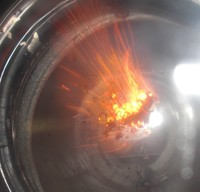Two students of the UCLA Henry Samueli School of Engineering and Applied Science are recipients of the prestigious Cadet Research Award from the United States Air Force, making them the first UCLA students to receive such an award on a national level. David Wirth, a departmental scholar (combined masters and bachelors) in aerospace engineering, and Joshua P. Kim, a third year aerospace engineering student, won the award based on their research centered around the use of nanotechnology in solid and liquid rocket propulsion, which could advance the area of photoenergetic rocket fuels (rocket fuels ignited by light).
“We’ve known about chemical reactions that are affected or initated by light for quite a long time –photosynthesis is a good example. But in 2002, it was discovered that certain types of carbon nanotubes are not only affected by light, but they can be made to combust when flashed with intense light.”said Wirth, who is specializing in MEMS and nanotechnology. “Our research is one of the first steps to engineer this effect to suit our needs, to ignite fuel without wires or sparks – using only light.”
With this technology, fuels can be ignited “volumetrically,” meaning with many ignition points spread out in two or three dimensions instead of just a single ignition point (such as a spark). Volumetric ignition creates a huge increase in pressure when fuel is combusted. The effect could potentially be used to increase the efficiency of gasoline, aircraft or rocket engines.
Wirth and Kim created a solid rocket engine which could be ignited, extinguished and restarted using only light as the ignition source. This year, the pair will focus on adapting the technology to be used in liquid fuels.
 Wirth’s work with Dr. Alireza Badakhshan and Dr. Stephen Danczyk at the Propulsion Directorate of the Air Force Research Laboratory (under the Vishal Parikh Memorial Scholarship) allowed for the discovery of new aerospace applications for nanotechnology. Dr. Badakhshan and Wirth later brought the project to UCLA under the supervision of Laurent Pilon, associate professor of mechanical and aerospace engineering. It was here at UCLA Engineering where additional pathways for the technology were explored – branching into the areas of microencapsulation, solid rocket propulsion and controlled volumetric ignition of solid rockets.
Wirth’s work with Dr. Alireza Badakhshan and Dr. Stephen Danczyk at the Propulsion Directorate of the Air Force Research Laboratory (under the Vishal Parikh Memorial Scholarship) allowed for the discovery of new aerospace applications for nanotechnology. Dr. Badakhshan and Wirth later brought the project to UCLA under the supervision of Laurent Pilon, associate professor of mechanical and aerospace engineering. It was here at UCLA Engineering where additional pathways for the technology were explored – branching into the areas of microencapsulation, solid rocket propulsion and controlled volumetric ignition of solid rockets.
Kim’s part of the research centered around the creation of mini and microfluidics to support the core nanotechnology research of Professor Pilon and Wirth. His machining expertise and support of the project allowed for the rapid testing of prototypes instrumental to the success of the project.
“This award was instrumental in getting UCLA recognized on an Air-Force–wide level as a leader in this field of research, and potentially opening up new partnerships between UCLA and the U.S. Air Force or the Air Force Research Laboratory,” said Wirth. “I am honored to be receiving this award with Joshua Kim after our work on the project last year.”
“It feels great to be recognized for our work but I’m reminded of the people who weren’t recognized,” said Kim. “The staff that supported us and our efforts deserve every bit of recognition as well. Without them, this award wouldn’t have been possible.”
For more information on the Air Force Research Laboratory at Edwards AFB, California, please go to: http://www.edwards.af.mil/
For more information on Professor Pilon’s research group, please go to: http://www.seas.ucla.edu/~pilon/.
Main Image: Air Education and Training Command – Cadet Research Award. Inset Image: Photoenergetic solid rocket fuel exhibiting volumetric ignition characteristics.
